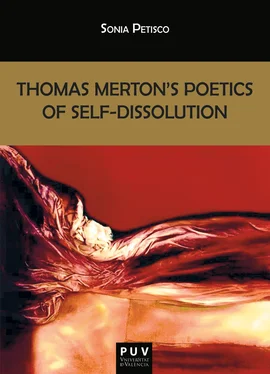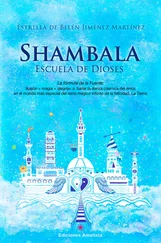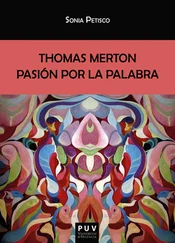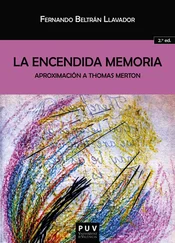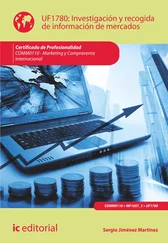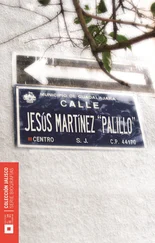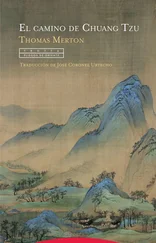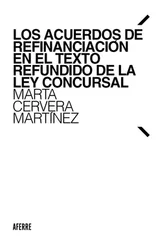Sonia Petisco Martínez - Thomas Merton's Poetics of Self-Dissolution
Здесь есть возможность читать онлайн «Sonia Petisco Martínez - Thomas Merton's Poetics of Self-Dissolution» — ознакомительный отрывок электронной книги совершенно бесплатно, а после прочтения отрывка купить полную версию. В некоторых случаях можно слушать аудио, скачать через торрент в формате fb2 и присутствует краткое содержание. Жанр: unrecognised, на английском языке. Описание произведения, (предисловие) а так же отзывы посетителей доступны на портале библиотеки ЛибКат.
- Название:Thomas Merton's Poetics of Self-Dissolution
- Автор:
- Жанр:
- Год:неизвестен
- ISBN:нет данных
- Рейтинг книги:5 / 5. Голосов: 1
-
Избранное:Добавить в избранное
- Отзывы:
-
Ваша оценка:
- 100
- 1
- 2
- 3
- 4
- 5
Thomas Merton's Poetics of Self-Dissolution: краткое содержание, описание и аннотация
Предлагаем к чтению аннотацию, описание, краткое содержание или предисловие (зависит от того, что написал сам автор книги «Thomas Merton's Poetics of Self-Dissolution»). Если вы не нашли необходимую информацию о книге — напишите в комментариях, мы постараемся отыскать её.
Thomas Merton's Poetics of Self-Dissolution — читать онлайн ознакомительный отрывок
Ниже представлен текст книги, разбитый по страницам. Система сохранения места последней прочитанной страницы, позволяет с удобством читать онлайн бесплатно книгу «Thomas Merton's Poetics of Self-Dissolution», без необходимости каждый раз заново искать на чём Вы остановились. Поставьте закладку, и сможете в любой момент перейти на страницу, на которой закончили чтение.
Интервал:
Закладка:
THOMAS MERTON’S
POETICS OF SELF-DISSOLUTION
Biblioteca Javier Coy d’estudis nord-americans
Directora
Carme Manuel
THOMAS MERTON’S
POETICS OF SELF-DISSOLUTION
Sonia Petisco
Biblioteca Javier Coy d’estudis nord-americans
Departament de Filologia Anglesa i Alemanya
Universitat de València
Thomas Merton’s Poetics of Self-Dissolution
© Sonia Petisco Martínez
1 aedición de 2016
Reservados todos los derechos
Prohibida su reproducción total o parcial
ISBN: 978-84-9134-180-2
Imagen de la portada: Francisco Petisco, Sin título (2010)
Diseño de la cubierta: Celso Hernández de la Figuera
Publicacions de la Universitat de València
http://puv.uv.es
publicacions@uv.es
To Manuel, Manu, to whom this book belongs
See! See! My love is darkness!
Only in the Void Are all ways one:
Only in the night Are all the lost Found .
In my ending is my meaning .
Thomas Merton, “The Night of Destiny”
TABLE OF CONTENTS
FOREWORD by Peter Ellis
INTRODUCTION
A CHRONOLOGY OF THOMAS MERTON’S LIFE & PUBLICATIONS
CHAPTER 1
Thomas Merton’s Poetic Evolution from World’s Denial to an Experience of Universal Love
CHAPTER 2
“O Sweet Escape! O Smiling Flight!”: Commentaries on a Selection of Poems by Thomas Merton
CHAPTER 3
Thomas Merton’s Antipoetry: A Revolution in Language and Thought
CHAPTER 4
Silence as the Path to Joy in the Poetry of Thomas Merton and T.S. Eliot
CHAPTER 5
Recovering Our Innocence: The Influence of William Blake on the Poetry of Thomas Merton
CHAPTER 6
Thomas Merton’s World Discourse: Economic Globalization vs Religious Universality
CHAPTER 7
Translation as Recreation: The Case of Thomas Merton
CHAPTER 8
Sophia, the Unknown, the Dark, the Nameless: Questioning the Male-Female Dichotomy through Thomas Merton’s Poetry
APPENDIX
REFERENCES
Foreword by Peter Ellis
Theology scholars have entry to the widest of fields of any discipline and see before them the largest number of paths to follow. The language they use offers so many different registers of meaning and so many opportunities for truthfully moving from one to the other that they often find themselves the surprised beneficiaries of hitherto unknown combinations of words and ideas. Many paths lead them to where others are working or have been before them. But it is also possible to take paths that are entirely new, that perhaps are marking out the first clearings in unknown forests or establishing possible meeting places in lonely unexplored landscapes. This volume presents the work of one such scholar of the new, Sonia Petisco, who has followed her own distinct path for over a decade. Her guiding light here is the Catholic monk Thomas Merton who died in 1968 and the centenary of whose birth is celebrated this year. Merton’s life was paradigmatic of the breakdowns of the twentieth century, and, fortunately for us, the changes he experienced in his thoughts and acts were recorded by him in an early autobiography, almost daily journal entries, letters and books. They record his flight from a world of cruelty, individual isolation and war to the age-old practice of monasticism as lived out in the Trappist monastery of Gethsemani in Kentucky, USA. Gradually over the years Merton reconnected with the world and became one of the great counter-cultural protest voices of the 1960s. Part of his increasing commitment to and enmeshment in the world was his writing of poetry which more and more pushed out at the boundaries of form as he matured.
Scholars in theology are also the least likely to hide their work behind the façade of objective, hands off, empirical research and the author of the essays in this book does not hide her self from the reader. This does not mean that we know about her life as we do about Merton’s, but, as with Merton, we gain an intimate knowledge of her ways of thinking and feeling and are able to observe them in these pages as they develop, nourished by and derived from the new philosophies of today, and driven on by current political realities. Hers is a philosophy that is as engaged as Sartre’s but in a rather different way. It is concerned with working out from lived experience exactly what the deictic personal pronouns – you, I and we – mean in the light of radical psychological and sociological research. This research is not simply reacting to and critiquing the tired and damaging norms of western thought but goes beyond them to new lands of new things in the true spirit of Hegel. Petisco’s contribution to this research is closely involved with a language that is open to “the other” – whether radically different others or simply our neighbours – and which exposes and goes beyond the gender divide embedded in its very structure. These essays are concerned with both these areas of self and gender in their discussion of language, and work through them in a spirit of going– beyond not just protesting–at to expose in her words “the collective illusions of our separateness in our societies and languages.”
Merton’s concerns with violence and war, with racism, with cruelty went far beyond the protests of his day because he saw very clearly from his background of daily worship in the monastery that anyone looking at the world had to ask deeper and more challenging questions. As he is quoted in one of the essays in this book: “A society that kills real men in order to deliver itself from the phantasm of a paranoid delusion is already possessed by the demon of destructiveness because it has made itself incapable of love.” Merton’s conclusion that the world is driven by insane reasoning, by obvious contradictions that seem to arouse no concern, and is fueled by desires for vengeance on other people who are different, resonates with greater power every year as we continue to amass weapons, despoil the planet and associate our over–consumption with our rights as free individuals. It is this that informs these essays, lies behind them and gives them their depth and meaning. Their author’s reaction to our world condition is not simply to point out its lies, as Merton did, but to follow him in seeking for seeds of hope, newness and change. She finds these in part in a search for ways to recast and revitalize language and to then go further and to put forward new interpretations which come from the freedom won by bringing words back to life. The essays illustrate the process.
Like Merton, Petisco’s use of language and of present–day philosophy is constantly measured against the benchmarks of contemplation, silence and a focus on the mysterious central presence of the Trinity, benchmarks that Merton did so much to reestablish in western thought in the twentieth century. The essays find fertile cross references between ideas, particularly as expressed in poetry. They explore Merton’s poems themselves, searching out inner meanings and clarifying their references. She also looks at other poets, particularly T.S. Eliot and William Blake, and illuminates the arguments for and against translation in an essay that demonstrates her ability to go beyond explanation to open up new ideas. Here she brings poetry back to a central position in language invoking the idea of a “field of common reason” where the words of the poem take us beyond author or translator. We live surrounded by words deriving from power and control that are devoid of depth and humanity. We flourish with words that are subtle and poetic, that bring us together with other people and that reconcile our exterior and interior divisions. It is most inspiring to follow arguments and discussions that are not simply scholarly enquiry but are dedicated to changing the damaged and damaging thought structures of the modern world itself.
Читать дальшеИнтервал:
Закладка:
Похожие книги на «Thomas Merton's Poetics of Self-Dissolution»
Представляем Вашему вниманию похожие книги на «Thomas Merton's Poetics of Self-Dissolution» списком для выбора. Мы отобрали схожую по названию и смыслу литературу в надежде предоставить читателям больше вариантов отыскать новые, интересные, ещё непрочитанные произведения.
Обсуждение, отзывы о книге «Thomas Merton's Poetics of Self-Dissolution» и просто собственные мнения читателей. Оставьте ваши комментарии, напишите, что Вы думаете о произведении, его смысле или главных героях. Укажите что конкретно понравилось, а что нет, и почему Вы так считаете.
